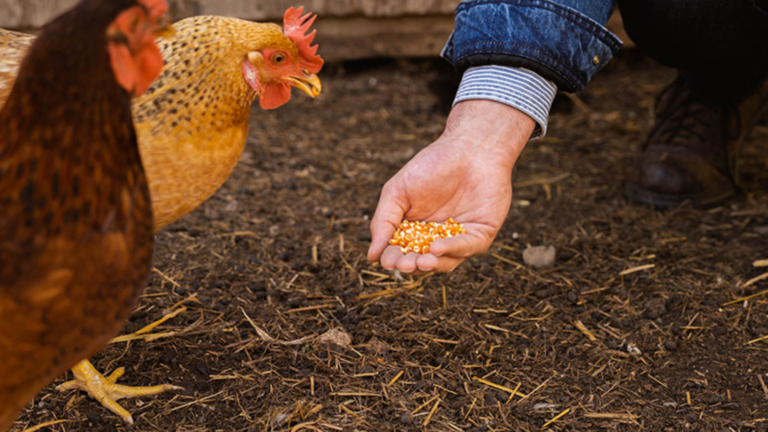Project will assess how antioxidant carotenoids in NutraMaize Orange Corn can mitigate negative health effects associated with heat-induced oxidative stress
NutraMaize, an agriculture company, has received a three-year, $460,455 grant from the National Institute of Food and Agriculture (NIFA), part of the U.S. Department of Agriculture.
The grant will study how a class of antioxidants called xanthophyll carotenoids affect egg-laying hens that experience heat stress. The project builds on previous studies conducted by NutraMaize and Purdue University collaborators funded by USDA Small Business Innovation Research grants. These studies demonstrated the ability of NutraMaize Orange Corn to reduce the incidence and severity of foot pad dermatitis in broiler chickens and significantly enhance yolk pigmentation in laying hens. The findings were published in the peer-reviewed journal Poultry Science.
NutraMaize was founded by CEO Evan Rocheford and his father, Torbert Rocheford, the Dr. Fred L. Patterson Endowed Chair in Translational Genomics for Crop Improvement and a professor of agronomy in Purdue University’s College of Agriculture. The company’s nutritionally enhanced orange corn is currently available through a line of premium milled products under the brand Professor Torbert’s Orange Corn.
Heat stress and its effects on laying hens
Evan Rocheford said heat stress is a major health and productivity challenge for egg-laying hens. Due to climate change, heat stress events are becoming increasingly frequent and severe, leading to physiological changes in laying hens. These changes result in reductions in productivity that equate to millions of dollars of lost revenue for egg producers every year.
“One of the major consequences is oxidative stress, which is caused by the production of excess free radicals, or unstable atoms that damage cells,” Rocheford said. “Antioxidants neutralize free radicals and prevent damage. Therefore, increasing the antioxidant intake of birds has been proposed as a mitigation strategy for heat stress.”
Several antioxidant compounds have demonstrated beneficial effects against heat stress, but no studies have been conducted on the effect of xanthophyll carotenoids.
“Xanthophylls are potent antioxidants and anti-inflammatory agents that have high physiological activity within laying hens,” Rocheford said. “Xanthophylls are involved in yolk pigmentation and they bioaccumulate throughout laying hens’ bodies. They provide the color of the birds’ distinctive yellow fat, beaks, shanks and feet.”
Goals of the NutraMaize project
Rocheford said the research project has three goals:
- Investigate the role xanthophyll carotenoids play in the physiological response of egg-laying hens during a heat stress event.
- Determine if increasing carotenoid intake can be used as a strategy to help mitigate the negative health and production effects of heat stress.
- Evaluate NutraMaize’s high-carotenoid Orange Corn as an alternative feed ingredient to deliver the potential benefits to egg-laying hens.
“NutraMaize Orange Corn has significantly higher xanthophyll carotenoid levels compared to yellow corn,” Rocheford said. “The carotenoids in orange corn also appear to be more bioavailable than commercial carotenoid supplements, making it an attractive alternative for delivering higher levels of carotenoids into the diets of laying hens.”
Rocheford said the project will test the hypothesis that the NutraMaize Orange Corn will deliver more carotenoids into the blood and tissues of egg-laying hens and increase their total antioxidant capacity. It is hypothesized that, in turn, this will reduce oxidative stress, stabilizing egg-laying hen health and performance during a heat stress event.
“This project will make a meaningful contribution to poultry science and the laying hen industry for a number of reasons,” Rocheford said. “First, there is a need for more investigation into the effects of heat stress on laying hens as most heat stress research is conducted on broiler chickens. Second, there is a need to investigate how heat stress affects laying hens across their lifetime, not just during an acute challenge period. Third, there have been no previous investigations into the role of xanthophyll carotenoids in the laying hens’ response to heat stress. Finally, if successful, this project would offer the laying hen industry a practical nutritional approach for addressing heat stress that also enhances yolk pigmentation and the nutritional quality of the table egg, one of America’s most important sources of protein.”
Research approach of the NutraMaize project
NutraMaize will collaborate with researchers at Purdue’s College of Agriculture and Egg Innovations, a leading producer of humanely raised eggs based in Warsaw, Indiana.
Purdue co-principal investigators Darrin Karcher, associate professor of animal sciences and poultry extension specialist, and Gregory Fraley, associate professor of animal sciences and the Terry and Sandra Tucker Endowed Chair in Poultry Science, will oversee a 90-week controlled environment heat stress study at Purdue’s Animal Sciences Research and Education Center. The NutraMaize and Purdue team will also work closely with Egg Innovations to conduct an 84-week field study on three 20,000-bird barns located across the Midwest.
Egg Innovations CEO John Brunnquell said, “As a leading producer of humanely raised eggs with an active research program, we are very excited to partner with NutraMaize and Purdue on this project. Heat stress is becoming an increasingly serious problem for producers like us, so there is an urgent need to identify practical and effective solutions to help mitigate its negative effects on both animal welfare and producer profitability.”
NutraMaize licenses its orange corn through the Purdue Innovates Office of Technology Commercialization.
NIFA is the extramural funding agency within the U.S. Department of Agriculture’s Research, Education and Economics mission area. This is the first year NIFA awarded grants under its Laying Hen and Turkey Research Program.

